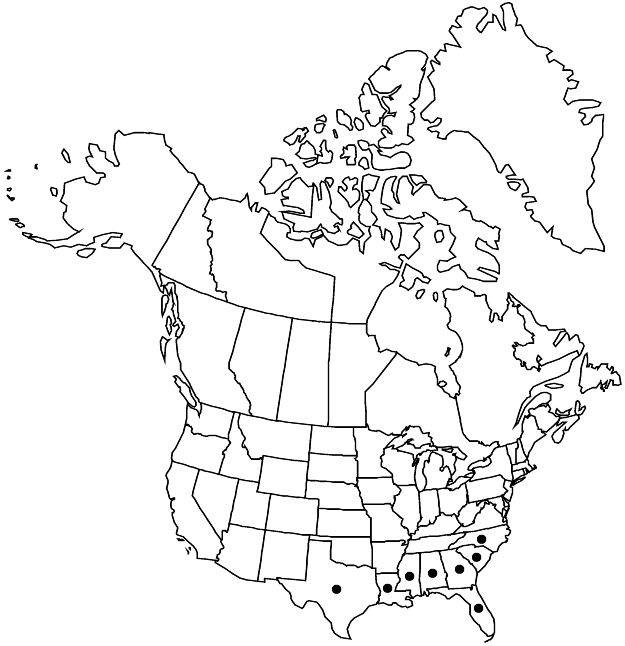Difference between revisions of "Viola septemloba"
Ann. Lyceum Nat. Hist. New York 2: 141. 1826.
FNA>Volume Importer |
imported>Volume Importer |
||
| (2 intermediate revisions by 2 users not shown) | |||
| Line 51: | Line 51: | ||
|publication year=1826 | |publication year=1826 | ||
|special status=Endemic | |special status=Endemic | ||
| − | |source xml=https:// | + | |source xml=https://bitbucket.org/aafc-mbb/fna-data-curation/src/2e0870ddd59836b60bcf96646a41e87ea5a5943a/coarse_grained_fna_xml/V6/V6_282.xml |
|genus=Viola | |genus=Viola | ||
|species=Viola septemloba | |species=Viola septemloba | ||
Latest revision as of 22:20, 5 November 2020
Plants perennial, acaulescent, not stoloniferous, 5–30 cm; rhizome thick, fleshy. Leaves basal, 5 or 6, prostrate to ascending; stipules linearlanceolate, margins entire, apex acute; petiole 1.5–7 cm, usually glabrous; earliest leaf blades ± ovate, sometimes 3-lobed, mid-season blades 7–9-lobed, 1–9 × 1–10 cm, base broadly cordate to cordate, middle lobes narrowly elliptic, lanceolate, spatulate, or obovate, (rarely linear), lateral lobes lanceolate or spatulate to falcate, margins usually entire, sometimes serrate, sometimes with narrowly deltate or falcate appendages or teeth, ciliate or eciliate, apex acute to mucronulate, surfaces usually glabrous. Peduncles 2–20 cm, usually glabrous. Flowers: sepals lanceolate to ovate, margins ciliate or eciliate, auricles 0.5–1 mm; petals light to dark blue-violet on both surfaces, lower 3 and sometimes upper 2 white basally, lower 3 darker violet-veined, lateral 2 densely bearded, spur sometimes bearded, lowest 15–25 mm, spur usually lilac, sometimes whitish, gibbous, 2–3 mm; style head beardless; cleistogamous flowers on ascending to erect peduncles. Capsules ellipsoid, 11–14 mm, glabrous. Seeds beige, mottled to bronze, 2–3 mm. 2n = 54.
Phenology: Flowering Mar–May.
Habitat: Sandy, dry or seasonally wet pine or mixed pine/deciduous woods
Elevation: 0–200 m
Distribution

Ala., Fla., Ga., La., Miss., N.C., S.C., Tex.
Discussion
For years this heterophyllous species was either ignored or included in Viola palmata. C. L. Pollard (1898) and E. Brainerd (1910, 1921) treated it as V. insignis Pollard, a later homonym.
Selected References
None.